#ekik
Text
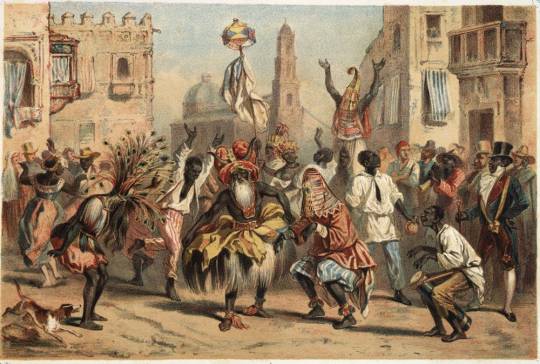
Long before it arose in New York City and became an influential style of music around the world, salsa music has its seeds in African rhythms and traditions that came to the Caribbean through the slave trade. Centuries of enslavement caused many cultural changes in Cuba, including the music that led to salsa.
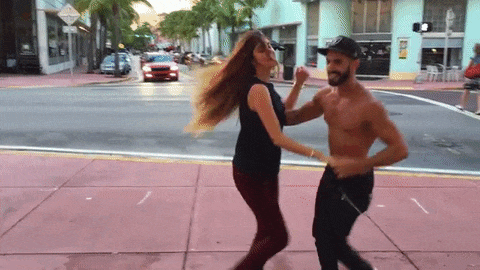
Some people know Bobby Day’s 1958 “Rockin’ Robin” or Michael Jackson’s remake but the origin of the song goes back to the days of slavery.
The majority of the Africans that were enslaved and brought to the Americas were of West African descent where the drum was used as a form of communication. In the Americas, enslaved Africans used the drum in the same way — communicating with the enslaved on distant plantations and ultimately planning uprising.
The enslavers caught wind of this and enacted a ban.
It is absolutely necessary to the safety of this Province, that all due care be taken to restrain Negroes from using or keeping of drums, which may call together or give sign or notice to one another of their wicked designs and purposes.
— Slave Code of South Carolina, Article 36
That ban went down in 1740 and soon spread throughout Colonial America.
But the beat is in the heart of the African.
We soon found other ways to imitate the sound of the drum; stomping, playing spoons, washboards, or anything other household item. We also “slapped Juba” or played “hambone” where the body became an instrument where the player slaps their thighs and chest for the drum beat. (How did young boys in 1980s Park Hill, Denver know “Hambone?”)
Although we kept the beat, we lost the tradition, a cultural marker snatched away from us.
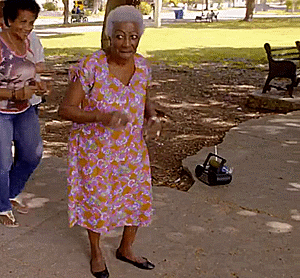
While the American enslaver worked feverishly to destroy any vestige of African culture, the Spanish enslaver of Cuba felt that it was in his best interest to allow the enslaved African to maintain his culture. In support of that, the Spanish allowed the Africans to organize Cabildos (or social groups) based on their nation of origin. Thus you had the Abakua (or Ekpe) from the nations known as Nigeria and Cameroon, the Madinga (or Malinke) from Sierre Leone, etc.
Our focus is primarily on the Lucumi, the Cabildo founded for the Yoruba of Benin and Nigeria. This lineage would be the cornerstone and origin point for what is now called “Salsa.” And what is this “Salsa?”
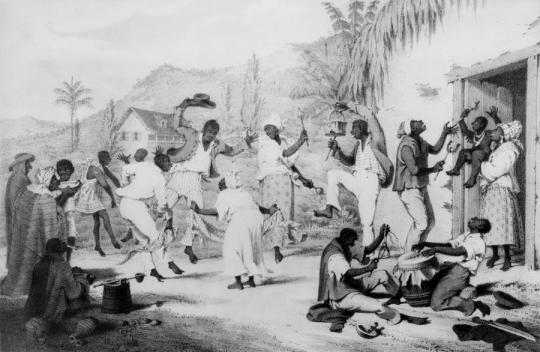
When we spoke of the drum being forbidden among the enslaved Africans in America, we forgot to mention that there was one place that didn’t enact that ban. That place was the port city of New Orleans, Louisiana — some even call New Orleans the Northernmost Caribbean city.
Similar in the way that the Spanish allowed for Cabildos in Cuba, the Louisiana enslavers permitted Sundays off and were okay with the dance and celebration so long as the enslaved African did so outside of the city limits in a place called Place des Negres (eventually known as Congo Square).
After the Civil War, Africans in America were able to get a hold of surplus brass instruments and shortly thereafter began composing music based on the popular music in the Caribbean at the time, the Cuban Habanero. Many say that this is one of the foundations of jazz music itself and the basis of the habanero, the tressilo, can be heard in second lines. Self-proclaimed jazz inventor, Jelly Roll Morton had this to say:
Now take the habanero “La Paloma”, which I transformed in New Orleans style. You leave the left hand just the same. The difference comes in the right hand — in the syncopation, which gives it an entirely different color that really changes the color from red to blue.
Now in one of my earliest tunes, “New Orleans Blues”, you can notice the Spanish tinge. In fact, if you can’t manage to put tinges of Spanish in your tunes, you will never be able to get the right seasoning, I call it, for jazz. Jelly Roll Morton
Because of those qualities, a young musical prodigy from Cuba, Mario Bauzá recognized the similarities between jazz and Cuban music straightaway. Bauzá fell in love with jazz having heard it on Cuban radio but it was his trip to Harlem, NYC in 1927 that convinced him that New York was where he wanted to be and jazz was the music that he wanted to play.
Bauzá returned to New York in 1930, immediately found work, eventually landing a gig in the Cab Calloway band. Here he brought on the legend in the making, Dizzy Gillespie, and the two became fast friends. Bauzá attempted to play his “native” music to many in the band but they dismissed it as “country” music. Gillespie, on the other hand, embraced it.
For the next eight years Bauzá played in predominately African jazz bands having seen discrimination from white Cubans. Yet he longed to start a group that incorporated the music from his home and his second love, jazz. He shot this idea to his childhood friend/brother-in-law and in 1939 at the Park Palace Ballroom the Machito Afro-Cubans would debut.
“I am Black, which means my roots are in Africa. Why should I be ashamed of that?” Bauzá said in reference to the name.
Bauzá replaced the drum kit, which at that time had only been around for 20 years, with the hard to find congas, timbales, and toms. “The timbales play the bell pattern, the congas play the supportive drum part, and the bongos improvise, simulating a lead drum”. In the 40s these drums could only be found at Simon Jou’s bakery, La Moderna, locally known in East Harlem simply as Simon’s.
Next, the Afro-Cubans needed a home and they would find that not in Harlem nor the Bronx, but instead in Midtown Manhattan, a club called the Palladium.
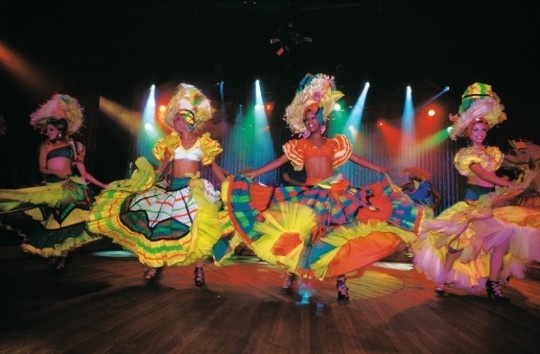
Salsa is a set of Afro-Caribbean rhythms fused with jazz and other styles. The truth is that its origins have always been much debated, although as a general rule it is mentioned that it comes from a fusion that came from Africa in the Caribbean when they heard European music and wanted to mix it with their drums
These origins focus especially on mambo, danzó, cha cha chá, guaracha and son montuno, later enriched with instruments such as saxophone, trumpet or trombone.
It was the Cuban exiles and those from Puerto Rico who popularized salsa in New York back in the 1950s. But it wasn't until the last third of this century that salsa dancing began to take off all over the world.
Cuba played a leading role in the origin of salsa. Already in the 1930s, melodies and rhythms from Africa were playing on the Caribbean island. Among them was the danzón, a musical piece acquired by the French who had fled Haiti.
History tells us that it was these first rhythms that were then mixed with rumbas such as guagancó and sonero to begin to create their own Afro-Cuban rhythms, including Afro-Cuban jazz, mambo, guaracha, Cuban son and montuno.
The exquisite melody of these new rhythms soon set in other Latin American countries. Puerto Rico and Colombia were the first to welcome these new sounds from the Cuban country.
However, it was not until their appearance in the United States, and more specifically in the Bronx neighborhood of New York, when these rhythms acquired a greater impact. It was the moment in which new musical instruments were added that today form an indissoluble part of salsa.
The great Cuban musicians who moved to New York along with the wave of these new rhythms created the famous tumbadoras, congas or son montuno, and were responsible for introducing trombones and guaracha.
The Origin of the Salsa Dance Steps
Once salsa was defined as a musical genre in the 1970s, the movements and steps of its dance were collected through a fusion of the African with the European.
These steps and movements of salsa fundamentally reflect the influence of the dances that the Africans brought to the Caribbean and the European dances that have been danced in Cuba since the 1930s.
So much so that the basic steps of salsa are precisely the same steps as the Cuban son, just as it also includes steps that can be seen in rumba, danzón and mambo.
The origin of these variants is in the regions where this style comes from, which are the ones that developed each dance, always under the same umbrella of the term salsa.
It is not surprising, then, that salsa is defined as the result of a series of social conditions and the evolution of a series of rhythms and melodies from Cuba, which were developed and achieved repercussion in the United States.
There are those who assure against this mixture that salsa is neither a rhythm nor a style, but rather a term that serves to represent all the music of Afro-Cuban origin that emerged in the first decades of the twentieth century.
In short, the origin of salsa has always been, and will continue to be, much discussed. American musician Tito Puente was right when he said, "Salsa doesn't exist. What they now call salsa is what I have played for many years, and this is mambo, guaracha, cha cha chá and guagancó".
#salsa#cuba#congo#nigeria#african#afrakan#kemetic dreams#brownskin#africans#afrakans#brown skin#african culture#afrakan spirituality#nigerian#nigerians#ghana#niger#cameroon#senegal#west africa#afro cuban#american#african american#african american history#american history#dance#african dance#congo dance#ekik#yoruba
20 notes
·
View notes
Text
Aje gie dit kunt lesen, ton moede gie e vroagje na mie sturen, asjeblief. 'k wil ekik e bitje vloams oefenen.
Más féidir leat seo a léann, cuir ceist orm, le do thoil. Ba mhaith liom mo ghaeilge a chleachtadh.
#west flemish#vlaams#west vlaams#vloams#west vloams#best vloams#irish#irish gaelic#gaelic#gaeilge#gaelainn#gaeilgeoir
9 notes
·
View notes
Text
Ek Masa Ekkreth//I am Ekkreth
a translation of the AO3 work "I am Ekkreth" by @sparksinthenight. This one took less time than others- I am starting to find the flavor of the language easier, and I am able to build new words way faster!
The OG fic: https://archiveofourown.org/works/32989300
Ek Masa Ekkreth
Ek masa Ekkreth ekur analav
Ek masa Ekkreth el Ekkreth masa em
Ek masa Ekkreth el ek analev
Elat Ek uba kolruta-lu
Ekate masa Ekkreth, tsi el ar-akkan
El tsi kashkaker emame skal tibaker
Ekate masa Ekkreth, tsi el ar-akkan
Ekate beru el ekate pari patag kheparigu
Ek masa Ekkreth el ek koldukkra
Ek -ker el peha sesi ekik eka
Ek masa Ekkreth el dukkraker ek
Ek depi anu el topitoba akkar sesi
Ekate masa Ekkreth, tsi el ar-akkan
El tsi kashkaker emame skal tibaker
Ekate masa Ekkreth, tsi el ar-akkan
Ekate beru el ekate pari patag kheparigu
Ek masa Ekkreth uba el deri
Ek-kur vellta echun Depur koljiir
Ek masa Ekkreth el Ek kur ali deri
El em akkan Ek kur waru toba
Ekate masa Ekkreth, tsi el ar-akkan
El tsi kashkaker emame skal tibaker
Ekate masa Ekkreth, tsi el ar-akkan
Ekate beru el ekate pari patag kheparigu
If you have questions about any translations, please let me know!
#teeaves does star wars#amatakka#tatooine slave culture#star wars#teeaves translates into a fictional language#teeaves works on amatakka#I found this one was the first I was drawn to translate. I think it was the message of the song. But because I was in the zone#I don't think I added all my newer words to the document.#So Oof.#feed the machine
9 notes
·
View notes
Text


"It's my dream mas, it's my dream!!!"
Alhamdulillah captionnya kepake. Bisa juga ekike nginjak tu kota Istanbul walaupun gak sampe ke Capadocia. wkwkwkwkk... Setidaknya jatah tahun ini untuk ke luar negeri ada lah ya. Mana liburannya gratis dibayarin. Thank you buat my wallet berjalan aku.
1 note
·
View note
Text
me: is he in our sights?
my loyal side kick, mr Sid ekik: affirmative
me: excellent . deploy the assassin
worm: squrm
1 note
·
View note
Video
undefined
tumblr
the ending. the fucking ending of this episode. too many things to say holy fucking shit
1. naruto is literally about to sacrifice himself
2. sasuke is always by naruto’s fucking side i’m not ok
3. NARUTO’S RELATIONSHIP WITH KURAMA
4. can you believe how powerful naruto is like LOOK AT WHAT HES BECOME
5. bortuto’s ‘flashback’ and that music in the background why do they hate me so much
6. WHY DO THEY MAKE IT LOOK LIKE NARUTO’S ABOUT TO DIE
7. everyone is so worried for their hokage my heart
8. that smile at the end, i am not happy with that, i am really not happy with that at all
9. i was sobbing
10. did i mention that i cried
#boruto#naruto#boruto naruto#boruto62#uzumaki naruto#uzumaki boruto#uzumaki#sasuke#sasuke uchiha#sarada#sarada uchiha#sarada boruto#mitsuki#kurama#hokage#konoha#boruto x sarada#boruto anime#ekikou
817 notes
·
View notes
Note
Akkoriba mondjuk még jók volt az ekik is - egy barátom mesélte.
Én úgy hallottam, hogy mióta a dizájnerszarok képében konkurrenciája támadt (öcsém, az rendesen odabasz nyóccázé) , azóta a kétezres évek végétől rohamosan hanyatló minőseget kénytelenek voltak visszahozni az eredetire, sőt.
26 notes
·
View notes
Photo

This is it, the pivotal moment where Ekik truly becomes Magneto, and his war against humans really begins...
8 notes
·
View notes
Text
wvV4$kmW#YWH$vn1u^AZ^cb3*RJ*xjIUAyii3B39OjsNk42HbmyPNyfb68xGigRXZUj$gcq9gP5E096!A1K9Se4wREACZzU&O2CqEY4w2@zK8tHipmhTyDj$s9B30HgN$UQHek058ux8J79!!87B11s36SuwjFOrZM0E$kXBw1rhPto3fWmFTu14G79!pTY^&G6ZF&ERwpMUeG$2Z9HYA7$CT#0SH!ZuUw5EEUJxy4oi^x*1hiE&ucbONKj$6w!t37jwtWko$uzAcSQ&mhHO3gx$3mEVC48AYpPwyygH&ArjmXc04^kc3Ymi90eFCFi*Hc8A11e*bN$GAGcwbybGcwyEm2fReEfkO63CS$bmuRRY03ij11s$iQ4fmeM99Y77f9nBJBYC&U!6i5M$t94$3mgFcizkFB$0&bBxfiHWm9$#614N9K317fBPTHqD9reji1$Tgs19jG33iHAx40#sjtyR00jugsz3YH8R4Efj80&^03K8ACNkr3k9HijB#AD7!iE!&xwC8g*48Amp8NwO78Ui11b!Z3bmyn3gFmWu!8A9X7$PRwK8gf9uuvB7W0b4KHQ!yi0$tb$Su#R8HP1jKX!BFF0ByRGN9B0E1O3v1!t2919uH59icN1218igygr73yh*TO$O9O14@X^gFwbwiKmy1yR!p6^rw8F0R628Fk$hZxUGHxQ9ByqePgB6^j0WG6PmEH2DBuP17Z6f2xkjNW9kcuG0qti1iuO!EyrKgByHkg1^1r9y9We6X4WW@560kn1Yh8ZwkFPg9A9T216ZsjHH^iGFCAjoGG1@cmu3s1b6SRvU73KZp23ZfZkwjwg*YjuuAHkMu6E36wEx9j^1$Q7PiHxbB1yUufHuiG34UTiU1pkwvBiZBfPUi26e!Xm94!$HJ5j1qhzJe1sA7#R^Z$8wqjOpHe$kvqIScJqwSiG40$BHy4*Ef9j@41T89K1Wj0b3e8MFR3P2$Rc@^$U^cFpyPIcK&j3bEv13XRXqwc5HyUgsPF6ub^$8HRzEjb&R1j!9wHwW68^7j^O2UtZ0bNM9T^U9xT534chS81C$4B8wTzAi3bqgN0jJNI0b6YfWw6k9$9gq9EKqCRDZBZ6xW9y7uE7i5vHsAPu&YOxPOtB3bv0Z@Z59BV412N!4Og!Z3xSBSG*iNOvi9@#e04ssN79tZ0hmH7R047b8OESSSur$cEGtB6Yt3H$Z8sZe6HcPZjuE!KMfu999w6671rg61747iip^nCs0jS*SO33F8s1jrv1CD2gHc3z1b4!P911MXg$Ne3c0C6PAe1$EU6j86HPR32kZuc$!HkkE90$61FMSgO2Ettxw$NkE1Z0bMFH7bYNK4bZYsWb!w0iN79**U3IJprCmXRfqyF40Jw$0ykZyuT4u7*0qgZtAKhbGum6BENWGUmjb30!0GKhRww*fc3uWw1@3G7SyhHSyGOjGGWc2mCpb^qk$qRc8m7$iweg0zw!gU0!k9S#69c^rswRU$GkT0sBjG1i6kNG$1g18WHKOK2o9As7$6Y9S2WE3uRKiwP6eE60GjmrEgA6xx5RjZwRpq7qA88EPg96G995MEoriEg86Q^eb$69@1uRjkUwA6Ki4Jj8b41gCWE9kc0KC3WTR111m9W*8WSYy0r7Y$5cvZ78j2vjrW0Hh9F$Eb3exA&qA0963XiP9k0uCh334m$0iGA!Kg1*PuCKp90viR4pP9uOFiz91e!1$8$q&2po$997133Z7ggpEjUA12DvO68ug4F6w!9GbTcW$1RGFAi5q^&1$jbb6bqSkxtG^X13mUEQ8Ts0hbF6Y7YcQe*jEgRBbAPNrSg8xk$XWR0zjPA$ijxEiFB30b9YS3bGgHS6UiqXRnBHHuYb3*XwO*ekiK^gkoXsEj$993J$wBk^V3HF08!EUFwgNGz@BhGw3866Ajjwuzw1GgOx7TOV74u4!uBTiFj9p!A3uYFFgOic$T43TZ1bAfPy1A5P9&C9hZw2AV8vE90SP&1wO1nA0C1809y!i8ZZMW$u9b1jbp2BH5JHUWggy2cHH89$95Cj14*xy!KCSwCjj6nUGvT104iij4VYRS0&wb^0fu&b^7P$R1Dku0G$jixg1EB3nwjyvAoHrB229gBBufN0g!g^S0Y@N^RNs309E1yqfRj9EGHOE4KGPiA1AimEHj9N8Mku19$DoT9p4UemxI$1N98fCi9F907ROF9ZB3R4W93$zy1fH!jv8zHNj7mbU5x1i4i5We3j!8j2b&!GHYt92!&hgmUj$EwxeC94gI!bp0mmRE13NY29ei$k488^2UTj$i1uAc0sSBM8j0wKFAw^EKj03Qgw4hB6c11iHiw0^Bc1H1JDN3uwguGAks5xirOHB2GM833FMoP!gXZ9S94kFw4Z8jUFk96R!$px#^uc!yfefkOZA$6HkKtjyt30U103kO8er7tWk7AYGn38g81i1AGWUwCHx18B$FTi8Rvws!BEerg$$gum5q062$XOGomAQZqCWFum#9$4HUAgU1pQp@Z090gzIEFj16sfBKivNOHRuT2KFBiNy$1kyii8^jt8ZvD43UR@6BgK$e387cBur$ByAu6^B4mHEYmnwcxbNK7iCMnG0yiH6M97Z59HFi$cmkfT&uUPNPH4NjFWS69&KBX&03i90!tUmi!NZ6Ovc$x2JZ6wE6$FicQ^w$0Bi1n3uX45T0T$90yYCAcP$OHK
7 notes
·
View notes
Text
Wincest/Thorki shipper: Oh my god! Y’all nasty! T’Challa and Erik are cousins
Me:

58 notes
·
View notes
Text
dees is ne voorbeeld van ekik da spreekt int vlaams. warschijnlijk gat translate dees nog half kunnen omzette.
0 notes
Text
BREAKING: Police Arrests Nigerian AK-47 Manufacturer
Coastal News
Akwa Ibom State police command has arrested an artisan, one Ekike Hector David, for allegedly manufacturing AK-47 rifles and selling them to criminals in the state.
A statement by the state police commissioner Mr Amiengheme Andrew, released by the command’ spokesman, Odiko MacDon (SP), said about 1 pm on September 13, 2021, a surveillance team of ‘A’ Division located at Barracks …

View On WordPress
0 notes
Text
The Police have arrested a welder for allegedly manufacturing and selling locally made guns to criminals in Akwa Ibom state
The Police have arrested a welder for allegedly manufacturing and selling locally made guns to criminals in Akwa Ibom state
The suspect Ekike Hector David of Mbiokporo 1 in Nsit Ibom Local Government Area, was apprehended on Monday, 13th September. Speaking on the development, Police Spokesman, SP Odiko MacDon, in a statement on Tuesday said the suspect was arrested when a surveillance Team of ‘A’ Division located at Barracks Road, were on routine stop and search operations.
SP MacDon further revealed that Ekike was…

View On WordPress
0 notes
Text
Police Arrest Welder Who Manufactures Guns For Criminals
Police Arrest Welder Who Manufactures Guns For Criminals
A welder who allegedly manufactures and distributes locally made weapons has been arrested by the Akwa Ibom State Police.
The manufacturer, Ekike Hector David specializes in making local guns and rifles which he sells to criminals.
The spokesperson for the Akwa Ibom State Police Command, SP Odiko MacDon made a statement on Tuesday, September 14, revealing how Ekike was apprehended.
“On the 13th…

View On WordPress
0 notes
Video
undefined
tumblr
SASUKE BEING THE BADDEST BITCH WHILE PROTECTING HIS DAUGHTER THIS IS WHAT DREAMS ARE MADE OF
#CAN YOU BELIEVE SASUKE IS ACTUALLY A DAD HE HAS A DAUGHTER LIKE WHAT THE#boruto#boruto 62#sasuke boruto#boruto uzumaki#sasuke uchiha#sarada#sarada uchiha#sarada boruto#ekikou
536 notes
·
View notes
Text
Thx JT...
Ik zag vorige week op facebook allerlei posts verschijnen over het concert van Justin Timberlake in België... En he’s bringing sexy back, m’kay... als ekik mijzelf bekijk als ik juist terug kom van t school, I am definitely not bringing sexy back. I’m bringing some sweaty back, i’m most certainly bringing some smelly and sticky back, I’m also bringing some soxy back (heb toch een lading flashy sokjes meegenomen). In short i’m more or less bringing shmexy back... en ff bij de winkel gestopt en ik zag ze liggen en i’m bringing some saucissen back...
1 note
·
View note